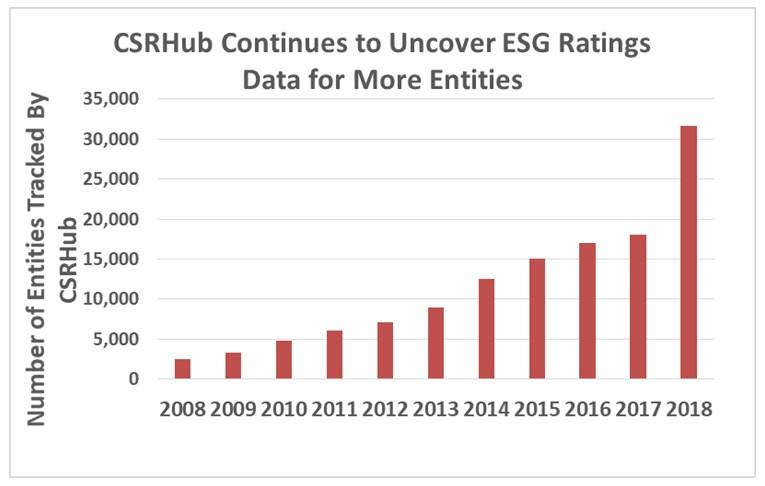ESG Coverage Is Improving
As previously seen on the CSRHub blog
We recently reviewed the ESG coverage status for the 8,686 companies in the MSCI ACWI (All Country World Index). The ACWI is a popular benchmark for many investors, because it includes approximately 85% of the global opportunities for equity investment. We felt it would be useful to see how much ESG information is currently available on the companies on this type of broad index.
CSRHub aggregates ESG data from more than 600 sources. Each source has a different coverage universe. By combining these universes, we have been able to offer full or partial ratings on 18,000 companies and know that there is at least some information on another 13,000 companies.
As you can see from the table below, we have reached the point where there is CSRHub ESG data on 95% of the companies and 99% of the “weighted value” in the Index. 5,777 companies (81% of the index weight) have full CSRHub scores (overall rating and scores for Community, Employees, Environment, and Governance factors). Another 1,116 companies (13%) have partial scores while 1,324 companies (15%) have some data, but not enough yet to allow calculation of a CSRHub rating.
See MSCI All Country World Index (ACWI) Data Availability Analysis.
We do not have data on the past components for this Index. However, we can look at the status for the current companies over the past five years. (CSRHub data reaches back to 2008.) As you can see below, there has been a dramatic improvement in the number of companies with ESG data over this time period.
See CSRHub Continues to Uncover ESG Ratings Data for More Entities.
One benefit of this increase in coverage is that ESG ratings can now be extended to cover corporate bond and high-yield debt portfolios. In a recent study of one such portfolio, we found full or partial ESG ratings in CSRHub on 1,681 of 1,789 holdings—94% coverage. It remains difficult to put ESG scores on sovereign and municipal bond issues. However, we have ratings now on many universities, cities, and states. We may also be able to impute a rating for a locality, based on the ratings of the companies that are headquartered there.
One of the excuses made for not integrating ESG information into corporate or investor decision-making has been that there are too many gaps in ESG data. It appears that the hard work of ESG sources around the world are gradually filling in these gaps so that we can create a consistent and holistic view of relative ESG performance for a wide range of entities.
Download the full report in pdf.
Bahar Gidwani is CTO and Co-founder of CSRHub. Bahar has built and run large technology-based businesses for many years. Bahar holds a CFA (Chartered Financial Analyst) and was one of the first people to receive the FSA (Fundamentals of Sustainability Accounting) designation from SASB. Bahar worked on Wall Street with Kidder, Peabody, and with McKinsey & Co. He has founded several technology-based companies and is a co-founder of CSRHub, the world’s broadest source of corporate social responsibility information. He has an MBA from Harvard Business School and an undergraduate degree in physics and astronomy. He plays bridge, races sailboats, and is based in New York City.
CSRHub provides access to the world’s largest corporate social responsibility and sustainability ratings and information. It covers 18,000 companies from 136 industries in 141 countries. By aggregating and normalizing the information from 618 data sources, CSRHub has created a broad, consistent rating system and a searchable database that links millions of rating elements back to their source. Managers, researchers and activists use CSRHub to benchmark company performance, learn how stakeholders evaluate company CSR practices, and seek ways to improve corporate sustainability performance.




